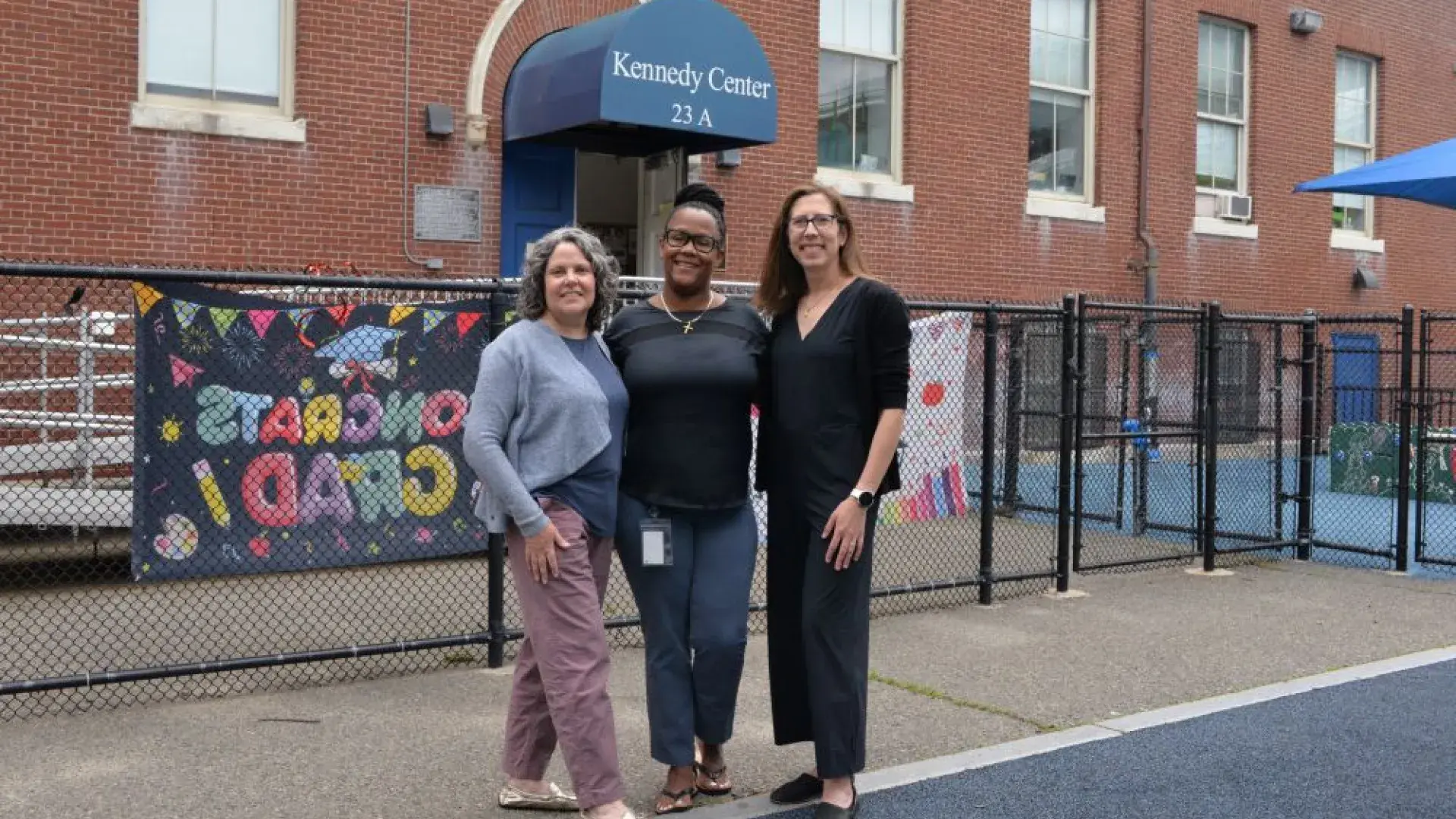
MGH Institute partners with RSM and Kennedy Center to support local families.
Faculty and students at the MGH Institute are trained, or are in training, to help people in a variety of ways. Sometimes that means helping an individual and sometimes that means implementing a system that can help many people. At the Kennedy Center Early Education Program in Charlestown, both of those things are true.
The Kennedy Center provides individuals and families in need with services, opportunities, and the tools they require to lead productive and fulfilling lives. The MGH Institute has a longstanding partnership with the Kennedy Center, especially in one of their focus areas — early education services.
The partnership has evolved through the years and now includes programs such as classroom support in its early education programs and serving as a resource for some of the students who need services, but one of the initiatives that is having a widespread impact is the implementation of the screening tool, the Ages and Stages Questionnaire (ASQ).
The ASQ provides information on the developmental level of the child that can indicate if they need to be monitored or referred for a service. Instead of waiting to see if there was a reason to screen a student, the goal was to evaluate all students twice per year and establish a process to consistently document the results.
“We identified that this was a huge area where they needed support,” said Jennifer Mackey, director of clinical education in the Department of Communication Sciences and Disorders and the coordinator of the Early Intervention concentration.
Mackey, who has been involved with the Institute’s work with the Kennedy Center since 2021, was also interested in implementation science and thought the approach would work well to ensure that each child could be assessed. MGH Institute’s Megan Schliep, an assistant professor in the CSD Department who joined the efforts in 2023, provided the implementation science guidance.
“Implementation Science provides us with theories, models, and frameworks to serve as a guide to implementation efforts. A big part of implementation science is putting a name to what's being done and using common terminology so that we can operationalize it,” said Schliep. “We did this when we initiated this strategy as part of our updated roll out. Defining implementation strategies highlights the concrete and tangible things that are being done rather than using more general phrases like ‘supported the process.’ It’s meant to be more specific than that. We even retroactively mapped implementation strategies to things that our team has done in the past — this is helping us to use the successful strategies to guide our next steps.”
The work is being done with funding from RSM in Charlestown, as well as integral work done by Ta’Nia Atkinson, the education coordinator at the Kennedy Center who led the training for teachers on how to use the ASQ as well as the online software to score them.
“It’s a true partnership and we took the time to build up trust between the different partners and establish shared goals,” said Mackey.
“My ultimate goal is to make sure that no child is left behind and that all children regardless of their socioeconomic status receive the support they deserve,” said Atkinson, who worked closely with both Mackey and Schliep on the project. “This project was not only to help the children we serve but also for the families so that they have a deeper understanding of the developmental milestones that their children should be reaching and how they as their parent/caregiver are their number one advocates.”
The combined work has paid off. The assessments take place in the fall and spring, and the team has achieved a rare feat — every single child was assessed and designated as either green, yellow, or red depending on their developmental profile.
“We wanted to make sure that kids in the red were hooked up with systems that were going to give them support, that they have fundamental rights for,” explained Mackey. “But we also then had this range of kids that were in the yellow zone, where we wanted to look at what support they might need instead of waiting to see what happens.”
That support may mean helping the child or the family access some of the free services available in the community, including at the Institute’s Julie Atwood Speech, Language and Literacy Center. It could also involve helping teachers who have those students in the classrooms learn strategies to support the child’s development.
“We’ve had occupational therapy and speech therapy students help with different groups and classrooms, but the next step is to see how we can get more help in there,” said Mackey.
Currently, Mackey is working with the Kennedy Center and MGH Institute CSD students to provide additional summer programming, including a five-week “I Wonder” language promotion curriculum that the team has developed. This initiative provides evidence-based language enrichment opportunities for Kennedy Center students, as well as clinical experiences for IHP graduate students who are building their skills while working with this population.
Do you have a story the Office of Strategic Communications should know about? If so, let us know.
